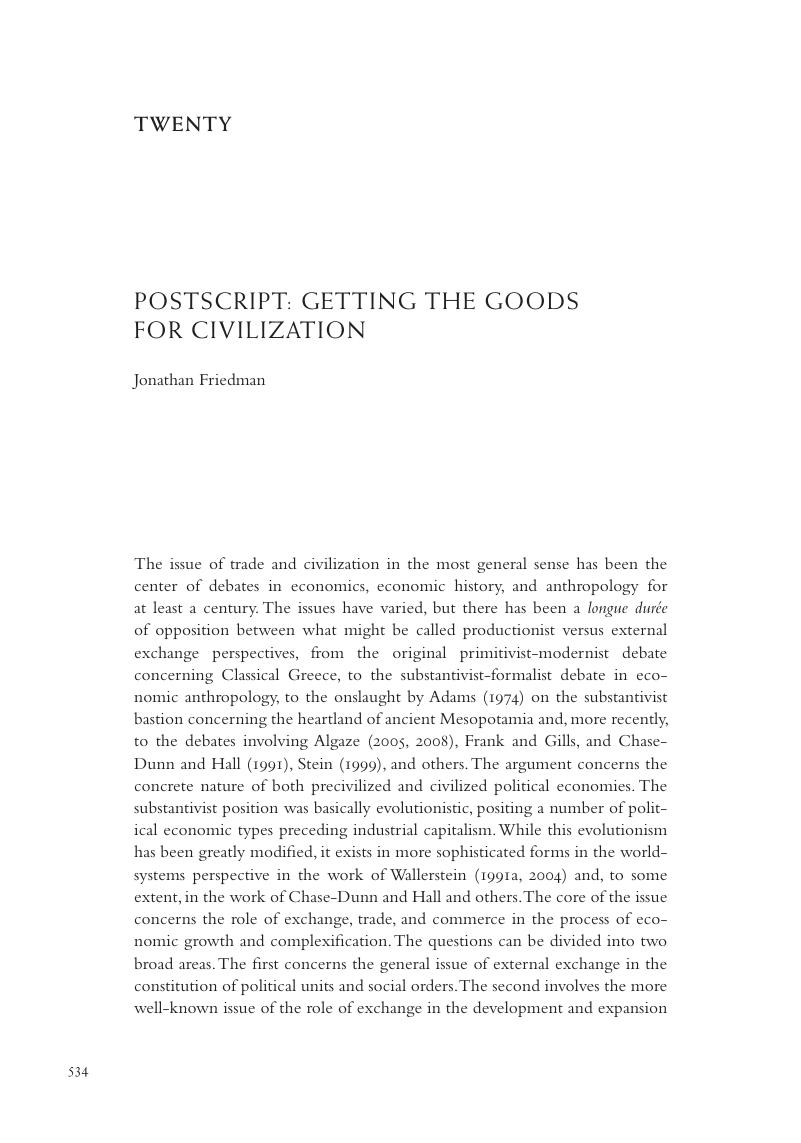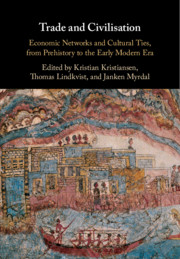Book contents
- Trade and Civilisation
- Trade and Civilisation
- Copyright page
- Contents
- Contributors
- Preface
- One Theorizing Trade and Civilization
- Two Cloth and Currency: On the Ritual-Economics of Eurasian Textile Circulation and the Origins of Trade, Fifth to Second Millennia BC
- Three Prices and Values: Origins and Early History in the Near East
- Four The Rise of Bronze Age Peripheries and the Expansion of International Trade 1950–1100 BC
- Five Interlocking Commercial Networks and the Infrastructure of Trade in Western Asia during the Bronze Age
- Six Mycenaean Glocalism: Greek Political Economies and International Trade
- Seven Deconstructing Civilisation: A ‘Neolithic’ Alternative
- Eight Marginalizing Civilization: The Phoenician Redefinition of Power circa 1300–800 BC
- Nine The Birth of a Single Afro-Eurasian World-System (Second Century BC–Sixth Century CE)
- Ten On the Silk Road: Trade in the Tarim?
- Eleven Trade, Traders, and Trading Systems: Macromodeling of Trade, Commerce, and Civilization in the Indian Ocean
- Twelve Trade and Civilization in Medieval East Africa: Socioeconomic Networks
- Thirteen Conflictive Trade, Values, and Power Relations in Maritime Trading Polities of the Tenth to the Sixteenth Centuries in the Philippines
- Fourteen The Hanseatic League as an Economic and Social Phenomenon: Archaeo-ceramic Case Studies in Cultural Transfer and Resistance in Western and Northern Europe, circa 1250–1550
- Fifteen Elliot Smith Reborn? A View of Prehistoric Globalization from the Island Southeast Asian and Pacific Margins
- Sixteen Trade-Light: The Political Economy of Polynesian and Andean Civilizations
- Seventeen Long-Distance Exchange and Ritual Technologies of Power in the Pre-Hispanic Andes
- Eighteen Empire, Civilization, and Trade: The Roman Experience in World History
- Nineteen World Trade in the Fifteenth and Early Sixteenth Centuries
- Twenty Postscript: Getting the Goods for Civilization
- Index
- References
Twenty - Postscript: Getting the Goods for Civilization
Published online by Cambridge University Press: 03 July 2018
- Trade and Civilisation
- Trade and Civilisation
- Copyright page
- Contents
- Contributors
- Preface
- One Theorizing Trade and Civilization
- Two Cloth and Currency: On the Ritual-Economics of Eurasian Textile Circulation and the Origins of Trade, Fifth to Second Millennia BC
- Three Prices and Values: Origins and Early History in the Near East
- Four The Rise of Bronze Age Peripheries and the Expansion of International Trade 1950–1100 BC
- Five Interlocking Commercial Networks and the Infrastructure of Trade in Western Asia during the Bronze Age
- Six Mycenaean Glocalism: Greek Political Economies and International Trade
- Seven Deconstructing Civilisation: A ‘Neolithic’ Alternative
- Eight Marginalizing Civilization: The Phoenician Redefinition of Power circa 1300–800 BC
- Nine The Birth of a Single Afro-Eurasian World-System (Second Century BC–Sixth Century CE)
- Ten On the Silk Road: Trade in the Tarim?
- Eleven Trade, Traders, and Trading Systems: Macromodeling of Trade, Commerce, and Civilization in the Indian Ocean
- Twelve Trade and Civilization in Medieval East Africa: Socioeconomic Networks
- Thirteen Conflictive Trade, Values, and Power Relations in Maritime Trading Polities of the Tenth to the Sixteenth Centuries in the Philippines
- Fourteen The Hanseatic League as an Economic and Social Phenomenon: Archaeo-ceramic Case Studies in Cultural Transfer and Resistance in Western and Northern Europe, circa 1250–1550
- Fifteen Elliot Smith Reborn? A View of Prehistoric Globalization from the Island Southeast Asian and Pacific Margins
- Sixteen Trade-Light: The Political Economy of Polynesian and Andean Civilizations
- Seventeen Long-Distance Exchange and Ritual Technologies of Power in the Pre-Hispanic Andes
- Eighteen Empire, Civilization, and Trade: The Roman Experience in World History
- Nineteen World Trade in the Fifteenth and Early Sixteenth Centuries
- Twenty Postscript: Getting the Goods for Civilization
- Index
- References
Summary

- Type
- Chapter
- Information
- Trade and CivilisationEconomic Networks and Cultural Ties, from Prehistory to the Early Modern Era, pp. 534 - 546Publisher: Cambridge University PressPrint publication year: 2018



